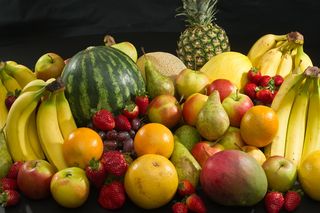
This article was originally published at The Conversation. The publication contributed the article to Live Science's Expert Voices: Op-Ed & Insights.
Nearly a third of all the food produced in the world is lost or wasted, according to the UN’s World Resources Institute. If we convert this mass into calories, it constitutes nearly a quarter of all food produced, which could have fed hungry and malnourished people around the world. But new technology that prolongs the life of fresh fruit and vegetables can help minimise this huge amount of waste.
It is a sad irony that we waste so much food – especially fruit and vegetables – but still fail to feed the world’s ever increasing population. Clearly, our ability to produce larger quantities of fruit and vegetables is not the only guarantee for global food security. We need to start minimising the amount of food that is produced and then lost.
Loss happens when food is spilt in transit or spoilt from heavy bruising or wilting. It is the unplanned result of an agricultural process gone wrong or technical limitations in storage, infrastructure, packaging or marketing. Good food is also wasted when it is simply thrown away before or after it spoils.
Keeping it fresh
A key way to minimise the amount of food lost is through postharvest technology, which can help make food last longer without losing nutrients. Once developed, it needs to be integrated into the global supply chain of food production.
We need to optimise the food we already produce, especially in developing countries. This can be done by significantly improving the way food is handled after harvesting, particularly to make the process more hygienic. We should make sure postharvest techniques are environmentally friendly and, of course, non-toxic to humans when applied to food.
The natural way
The use of natural biodegradable products as an alternative to synthetic chemicals has shown remarkable improvements in maintaining fruit quality and extending shelf life. These natural products are non-toxic to humans and safe.
Sign up for the Live Science daily newsletter now
Get the world’s most fascinating discoveries delivered straight to your inbox.
Chitosan, for example, is a natural product obtained from crustacean shells. It has been shown to significantly maintain papaya fruit when applied to it. In combination with Gum Arabic (hardened sap obtained from the acacia tree) it can also delay the ripening of bananas. Gum Arabic can also be used on its own to enhance the shelf life and postharvest quality of tomatoes. Cinnamon oil is another natural product that has been shown to delay postharvest rotting in bananas and extending their storage life for up to 28 days.
Our research at the Centre of Excellence for Post-harvest Biotechnology at Nottingham University’s Malaysia Campus is making these natural products into nano-forms or submicron particles to control postharvest diseases. This technology has so far been used to delay ripening in tomatoes and enhance their phenolic content, as well as extending the life of dragon fruit for up to 28 days. These are just a few examples, with many more being developed to improve the quality and shelf life of fresh fruit to help stop it going to waste.
Environmentally friendly
The way that fresh food is packaged is crucial to how long it can last. Synthetic chemicals are currently used to control postharvest diseases but consumers worry about the chemical residues they leave on fruit, their environmental impact and the potential for pathogens to become resistant to them. Our research is a response to this, developing more environmentally friendly and non-chemical approaches.
This includes packing food in containers that modify the atmosphere to prevent decay, hot water treatment or blanching and most importantly using natural biodegradable products as an alternative to synthetic chemicals. Once proper postharvest technologies are used efficiently, food losses can be minimised and the problem of food insecurity alleviated.
We believe that developing postharvest management techniques using natural products is the way forward, especially since these natural biodegradable products we are researching can also contribute to traditional medicine and pharmacology as we learn more about our natural environment. Hopefully too, we can develop better ways of reducing the huge amount of food loss that takes place and focus on getting food to those who need it.
Asgar Ali receives funding from the Ministry of Agriculture, Malaysia.
This article was originally published on The Conversation. Read the original article. Follow all of the Expert Voices issues and debates — and become part of the discussion — on Facebook, Twitter and Google +. The views expressed are those of the author and do not necessarily reflect the views of the publisher. This version of the article was originally published on Live Science.
Most Popular


